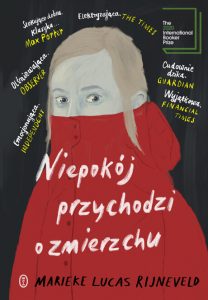The Discomfort of Evening
Autorstwa Olga Kulig

The Discomfort of Evening is a book written by 30 year old Dutch author Marieke Lucas Rijneveld, which was translated into English from its original title “De avond is ongemak.” The book was inspired by the death of Marieke’s brother while she was three years old.
Life consists of details. Little snippets, moments and approximations. But what is it that makes the individual components form a common and coherent whole? What makes these details stay in a constant position in relation to each other? Is there some gravitational center around which they orbit? Or more prosaically, have they been glued together by a magical glue? What gives them their fixed structure?
Let us assume that there is some undefined force that keeps the details of life in motion and in mutual relation. Which gives them a common direction and a common identity. The very structure. In order for such a life, understood as a collection of details, to work, do specific conditions have to be met? Does it have to contain all the given and acquired elements permanently?
And what if one element is suddenly missing?
For example, the smelly cow cream rubbed on the face by a caring mother? The yellow layer of cream sticking to your palate? The unruly curl on your forehead?
Will there be a gaping hole left behind forever? Will this gap, this void, be filled with something new with time? Single details will gently and slowly, yet relentlessly, begin to change their own trajectory, thus returning to the previous balance of power? Will they fill the void, regaining the status quo from before the loss? Or will they at least mask it? Will it be impossible to salvage such a depleted here and now, and must all remaining details and conditions be converted as quickly as possible, while the continuity of this structure still exists?
Or maybe the balance will be disturbed permanently and details will scatter disorderly, deprived of their concentrating force?
Marieke Lucas Rijneveld reflects on the dynamics of these phenomena in her delightful book “The Discomfort of Evening“. The young Dutchwoman, rightly awarded the Booker prize, looks at the mechanism of life and the consequences that arise when the balance of power is disturbed.
The coziness of rural life is the backdrop for a story of family trauma. Interactions, expectations, and fears, told from the perspective of the ten-year-old narrator, pulsate with the weight of guilt. The prose, dense with detail, is overwhelming in its realism. The world is as real as it is brutal.
True, which is brutal.
The death of the oldest child in the family sets off a chain reaction of disintegration. Individual family members, who previously constituted a whole, close themselves in their own pain. They wrap themselves in grief and remorse like a warm pudding. It seems that if there is any common denominator for this family now, it is loneliness. It has encroached between the household and has led to a disintegration of relationships and emotions. Parents do not take care of children, children devise probable and improbable types of their parents’ deaths. For practice, so as not to be surprised a second time. The only manifestations of children’s feelings are new tics.
“Father and mother don’t see our tics. They haven’t figured out that the fewer the rules, the more we make them up ourselves. “*
That is, rules. Rules are able to maintain the planetary movement of life. To maintain balance in the torn structure of detail. Rules can restore rhythm, pulse. Step by step lead out of trauma. Fill the hollow in the mattress of the dead. Give back meaning. Restore logic. Even if the rule is to become mortification, torment and mutilation. According to Newton’s dynamics, centrifugal force and centripetal force balance each other. Common direction, different vectors. So the thesis should be replaced by the antithesis. Caring is masochism. Childish innocence – sexual arousal. Truth – fiction. Life – death.
Or maybe this already violated structure of life, intertwined with childish imaginings and experiences, is not subject to the laws of physics? And it cannot be fixed by simple logic. Maybe the ancients were right? This logic will betray us. And so will astronomy.
A cruel God demands sacrifices. Weeping is replaced by madness.
You can turn out the light.
———
*M.L. Rijneveld, “Niepokój przychodzi o zmierzchu” (“Anxiety Comes at Dusk”), published by LIterackie, Krakow 2021, p. 84
Więcej rekomendowanych książek znajdziecie tutaj.
-
8 June 2025
Systemowa i narracyjna terapia traumy u dzieci
Systemowa i narracyjna terapia traumy u dzieci – Sabine Vermeire czyli książka dla każdego kto współpracuje z dziećmi.
-
23 October 2024
Mówimy o tym głośno
Najwyższy czas przekazać informacje o tym jak bardzo są potrzebni opiekunowie/rodzice zastępczy, dlaczego ich nie ma i co można zrobić, żeby nie tylko zostali ci którzy już tworzą rodziny zastępcze, ale pojawiali się kolejni kandydaci do ich prowadzenia.
-
15 August 2024
Standardy Ochrony Małoletnich
15 sierpnia 2024, na mocy ustawy Kamilka, w całej Polsce zaczynają obowiązywać standardy ochrony małoletnich. Dzisiaj zaczęły obowiązywać także w Fundacji PROJEKT ROZ.
-
23 March 2024
Niewidzialne Dzieci w kontekstach
Kim są dzieci, które są niewidzialne dla systemu, lub co do których nie widzi się wystarczającego powodu istnienia i życia w godnych warunkach rozwojowych, edukacyjnych, rówieśniczych? Wymykają się, są niewidzialne lub spychane są na margines usług.
-
8 December 2023
105 portretów Polek
Elżbieta Matusiak to bohaterka cyklu “105 portretów Polek”. W grudniu motywem przewodnim jest “Rodzina”.
Taki mój Portret przedstawiła Paulina Zywart.
-
22 January 2024
Współpraca
Podpisanie porozumienia o współpracy pomiędzy Politechniką Krakowską im. Tadeusza Kościuszki Wydziałem Informatyki i Telekomunikacji, Firmą Unit Unicorn i Fundacją PROJEKT ROZ.
-
8 January 2024
Darowizna od opiekunów zastępczych
Zgodnie z art. 14 ust. 4a ustawy o podatku od spadków i darowizn, za zstępnych uważa się również osoby, które przebywają lub przebywały w rodzinie zastępczej …
-
30 November 2023
Nic nie czuję
Na poziomie społecznym chcemy wytłumaczyć (…), kim są ci młodzi ludzie, którzy borykają się z problemami psychicznymi i co sprawia, że są zmuszeni sięgać po pomoc. To słowa twórców filmu “Nic nie czuję”.
-
26 August 2022
NON-FICTION 2022
Rozmowa o pieczy zastępczej, przeprowadzona w czasie Festiwalu Non – Fiction w Krakowie w 2022 roku z Martą Wroniszewską i Elżbietą Matusiak
-
20 June 2023
Deinstytucjonalizacja pieczy zastępczej
Deinstytucjonalizacja. Co o niej wiemy? To droga czy efekt? Czy zmierzamy w słusznym kierunku?
-
30 May 2023
FAL Fun A-Long – Miłość do kwadratu
FAL (CAL+KAL) ‘Miłość do kwadratu’ to wspólna przygoda szydełkowo-drutowa i wsparcie Fundacji PROJEKT ROZ. Jednocześnie propagowanie wiedzy o pieczy zastępczej.
-
14 April 2023
Raport NIK – Za dużo domów dziecka, za mało rodzin zastępczych
Od 1 stycznia 2012 r. obowiązuje w Polsce ustawa o pieczy zastępczej. Zgodnie z jej postanowieniami państwo ma obowiązek zapewnić opiekę zastępczą dziecku, którego rodzice biologiczni z różnych względów nie mogą sprawować nad nim opieki.
-
4 April 2023
The Fosters
The Fosters – amerykański serial dramatyczny. Tak w dwóch słowach to serial o pieczy zastępczej.
-
23 February 2023
Nowelizacja ustawy o wspieraniu rodziny i systemie pieczy zastępczej. Pytania i odpowiedzi. część 1
Nowelizacja ustawy o wspieraniu rodziny i systemie pieczy zastępczej. Pytania i odpowiedzi.
Część 1 – podręcznik -
23 February 2022
MATEXI inspiruje i pomaga
Wspierać można w różny sposób. Taki pomysł na pomaganie ma MATEXI Polska.
-
17 November 2021
Ozdoby świąteczne
Świąteczne ozdoby z różnych krajów świata, różnych kultur, różnych projektów, ale z tym samym przesłaniem: POKÓJ-WSPÓŁPRACA-ZROZUMIENIE
-
31 August 2021
Białe płatki, złoty środek. Historie rodzinne
Paweł Piotr Reszk. Wydawnictwo Agora. rok 2021
-
12 November 2020
Zmiany w Fundacji
Nastąpiły, ustalane od pewnego czasu zmiany w Fundacji. Zmiany w Zarządzie w Radzie i adresie siedziby.
-
31 October 2020
Kompetencje społeczne zawodowych rodziców zastępczych
Jan Basiaga i Iwona Łukasik prezentują badania własne dotyczące kompetencji społecznych zawodowych rodziców zastępczych – Problemy Opiekuńczo-Wychowawcze 2020; 593 (8): 44-58
-
24 July 2021
滋賀はどこにあるか知っていますか?
To cykl spotkań studentów z Uniwersytetu Shiga w Japonii z mieszkańcami “Małego Księcia” w Krakowie. To co poznane / oswojone, staje się przyjazne. Uczymy się od siebie.


